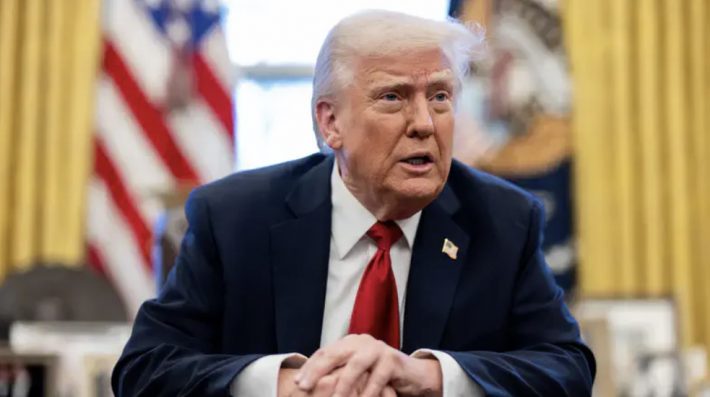President Trump and VP JD Vance rebuke Israel’s Knesset for advancing sovereignty over Judea and Samaria, warning it could cost U.S. backing.
In a stunning turn of events, U.S. President Donald Trump publicly rebuked Israel’s sovereignty move over Judea and Samaria, warning that any step toward applying Israeli law to the biblical heartland could “cost Israel all U.S. support.”
Speaking to reporters at the White House on Thursday, Trump dismissed Israel’s Knesset vote on sovereignty, saying:
“Don’t worry about the West Bank. Israel’s not going to do anything with the West Bank, okay? They’re not going to do anything with it.”
His remarks came just hours after Vice President JD Vance, departing Tel Aviv aboard Air Force Two, expressed visible irritation over the Knesset’s preliminary vote to extend sovereignty over parts of the region.
“If it was a political stunt, then it was a stupid political stunt, and I take personal insult to it,” Vance fumed, calling the vote “weird” and “confusing.”
The sovereignty bill, introduced by opposition lawmakers, sought to reaffirm Israel’s eternal right to Judea and Samaria—the very heartland where Jewish civilization was born. Though the measure passed its first reading, Prime Minister Benjamin Netanyahu has reportedly halted further advancement amid U.S. diplomatic pressure.
In an interview with TIME Magazine, conducted just before the Knesset vote, Trump made his position crystal clear:
“It won’t happen. I gave my word to the Arab countries. And you can’t do that now. We’ve had great Arab support. It will not happen. Israel would lose all of its support from the United States if that happened.”
The blunt language stunned many in Jerusalem—especially coming from the man once hailed as Israel’s strongest ally and the architect of the Abraham Accords.
Yet for many Israelis, Trump’s warning cuts deeper than policy—it strikes at the divine promise itself.
From the Covenant of Abraham to modern Israeli law, Judea and Samaria are not bargaining chips; they are the covenantal core of the Land of Israel.
The reaction among Israeli leaders has been mixed. Coalition members insist the bill was symbolic, meant to reaffirm Israel’s historic claim. Right-wing lawmakers blasted Washington’s response as “betraying biblical truth for political convenience.”
“No U.S. president can undo what God decreed to Abraham, Isaac, and Jacob,” one Knesset member said. “Judea and Samaria are not up for debate—they are our inheritance.”
As Vice President Vance’s plane lifted off from Ben Gurion Airport, the symbolism was impossible to ignore: the White House may seek to ground Israel’s sovereignty, but the Jewish state’s roots in its land run far deeper than any administration’s approval.
In the battle between political promises and divine promises—history has already chosen its side.In a stunning turn of events, U.S. President Donald Trump publicly rebuked Israel’s sovereignty move over Judea and Samaria, warning that any step toward applying Israeli law to the biblical heartland could “cost Israel all U.S. support.”
Speaking to reporters at the White House on Thursday, Trump dismissed Israel’s Knesset vote on sovereignty, saying:
“Don’t worry about the West Bank. Israel’s not going to do anything with the West Bank, okay? They’re not going to do anything with it.”
His remarks came just hours after Vice President JD Vance, departing Tel Aviv aboard Air Force Two, expressed visible irritation over the Knesset’s preliminary vote to extend sovereignty over parts of the region.
“If it was a political stunt, then it was a stupid political stunt, and I take personal insult to it,” Vance fumed, calling the vote “weird” and “confusing.”
The sovereignty bill, introduced by opposition lawmakers, sought to reaffirm Israel’s eternal right to Judea and Samaria—the very heartland where Jewish civilization was born. Though the measure passed its first reading, Prime Minister Benjamin Netanyahu has reportedly halted further advancement amid U.S. diplomatic pressure.
In an interview with TIME Magazine, conducted just before the Knesset vote, Trump made his position crystal clear:
“It won’t happen. I gave my word to the Arab countries. And you can’t do that now. We’ve had great Arab support. It will not happen. Israel would lose all of its support from the United States if that happened.”
The blunt language stunned many in Jerusalem—especially coming from the man once hailed as Israel’s strongest ally and the architect of the Abraham Accords.
Yet for many Israelis, Trump’s warning cuts deeper than policy—it strikes at the divine promise itself.
From the Covenant of Abraham to modern Israeli law, Judea and Samaria are not bargaining chips; they are the covenantal core of the Land of Israel.
The reaction among Israeli leaders has been mixed. Coalition members insist the bill was symbolic, meant to reaffirm Israel’s historic claim. Right-wing lawmakers blasted Washington’s response as “betraying biblical truth for political convenience.”
“No U.S. president can undo what God decreed to Abraham, Isaac, and Jacob,” one Knesset member said. “Judea and Samaria are not up for debate—they are our inheritance.”
As Vice President Vance’s plane lifted off from Ben Gurion Airport, the symbolism was impossible to ignore: the White House may seek to ground Israel’s sovereignty, but the Jewish state’s roots in its land run far deeper than any administration’s approval.
In the battle between political promises and divine promises—history has already chosen its side.





